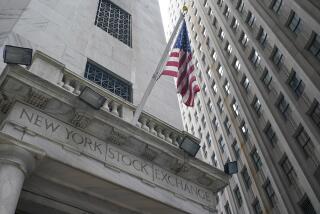U.S. has a duty to stay, Iraqi says
- Share via
BAGHDAD — Iraq’s foreign minister on Monday predicted that his country would splinter into warring fragments and the conflict could spread across its borders if American troops pull out before Iraqi forces are ready to handle security.
The United States has a duty to prevent such a scenario, he said.
The grim forecast from Hoshyar Zebari coincided with rising pressure on President Bush and Iraqi Prime Minister Nouri Maliki from political opponents who want to see the U.S. occupation end.
Zebari, in remarks before taking questions at a news conference, alluded to rumors that some Sunni Arab lawmakers were trying to orchestrate a no-confidence vote against Maliki to bring down his Shiite-led government.
“There is rising speculation about the stability of the government,” he said. “These speculations are exaggerated.”
By mentioning the rumors, Zebari made clear that the chatter had caught the government’s attention.
Stalemate in parliament
As he spoke, Iraq endured another day of bloodshed and political stagnation. More than 50 people were killed or found dead in violence believed linked to the sectarian war. In the 275-seat parliament, two important political blocs, one Sunni and one Shiite Muslim, continued their boycotts, making it impossible for lawmakers to pass bills that would carry any sense of legitimacy.
Salim Abdullah Jabouri, the spokesman for the main Sunni bloc, said it had no plans to end its boycott. The 44-member bloc is protesting attempts by other lawmakers to oust the Sunni parliament speaker.
But Jabouri said the legislators would return to parliament if a no-confidence vote was called.
“We think there are sides that are considering this,” Jabouri said. “Theoretically if it happens, we will come and vote to oust [Maliki].”
The 30-member bloc of politicians loyal to radical Shiite cleric Muqtada Sadr also is boycotting parliament to protest what it says is the government’s failure to provide adequate security. The bloc’s walkout followed the bombing last month of a Shiite shrine in Samarra, about 60 miles north of Baghdad. It was the second time the Golden Mosque had been attacked.
While Sadr’s supporters remain technically part of Maliki’s political alliance in parliament, lately they have stepped up their rhetoric against his leadership.
At a news conference Sunday, an official in Sadr’s office in the city of Najaf said it was “very clear that the government is ending.”
Sheik Ahmed Shibani, the Sadr official, accused Maliki of sending a message to U.S. troops that he was “ready to execute” their agenda to crush the Sadr movement. Shibani warned that this could work against Maliki, who owes his election as prime minister to votes from Sadr legislators.
“Maliki should not forget that the one who supported his government and supported him personally is the Sadr movement,” Shibani said.
Oil legislation
On top of their other complaints about Maliki, Sadr supporters and the Sunni bloc are angry over new legislation to manage Iraq’s oil industry, which the prime minister has urged parliament to pass to satisfy White House demands for political progress.
The Sunnis say the bill should not be approved until constitutional reforms are finalized spelling out regional powers over natural resources.
Many Sadr supporters say the bill is being pushed by the U.S. because it would allow foreign investment in the industry. They believe the move is part of a plot to give American companies control of Iraqi oil.
U.S. officials say the law would help end Iraq’s violence by spreading oil wealth among Sunni, Shiite and Kurdish regions.
Maliki had predicted that the bill would go before parliament last week, but it has yet to be presented to lawmakers, and passage is uncertain.
Border with Turkey
Another crisis appeared to be looming in northern Iraq, where Zebari said Iraqi intelligence indicated Turkey had tens of thousands of troops on the border poised to conduct raids against Kurdish rebels.
Turkey has accused the rebels of staging attacks on its territory from Iraq’s Kurdish region and last week said it had plans drawn up to cross the border if the attacks did not stop.
Zebari said Iraq did not want the Kurdish rebels operating on its territory but could not spare troops to stop them.
“Our troops are overstretched. We are fighting terrorism here in the streets and neighborhoods of Baghdad,” he said. He said the government was trying to arrange talks between Iraq, Turkey and the U.S. as soon as possible to defuse the situation.
‘Dangers are grave’
Asked about the possibility of U.S. troops withdrawing, Zebari said he knew that the Bush administration faced “tremendous” pressure to end the war but that it had a responsibility to remain until Iraq’s security forces could protect the country.
Otherwise, he said, there was danger of a civil war, regional war and possibly the collapse of the country.
“Some people may disagree with this evaluation, but in our estimate the dangers are grave,” Zebari said.
The latest victims of sectarian bloodshed included 12 soft-drink-factory workers who were abducted Sunday in southeastern Baghdad as they rode to work in a factory van. They were all found shot to death Monday, police said.
Four roadside bombs exploded in various parts of the capital, killing at least six civilians and one police officer, according to police and hospital officials. Police also reported finding 29 bodies of unidentified men in Baghdad who had been shot to death and were believed to be victims of sectarian death squads.
In Tarmiya, about 25 miles north of Baghdad, eight Iraqis died in a mortar attack.
Times staff writer Saif Hameed and special correspondents in Baghdad contributed to this report.
More to Read
Sign up for Essential California
The most important California stories and recommendations in your inbox every morning.
You may occasionally receive promotional content from the Los Angeles Times.














